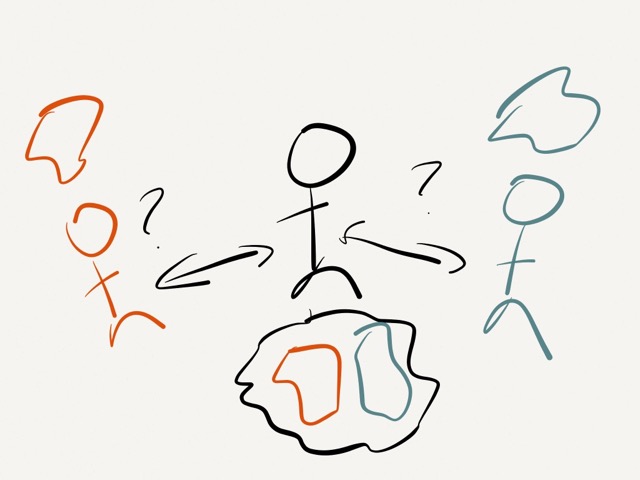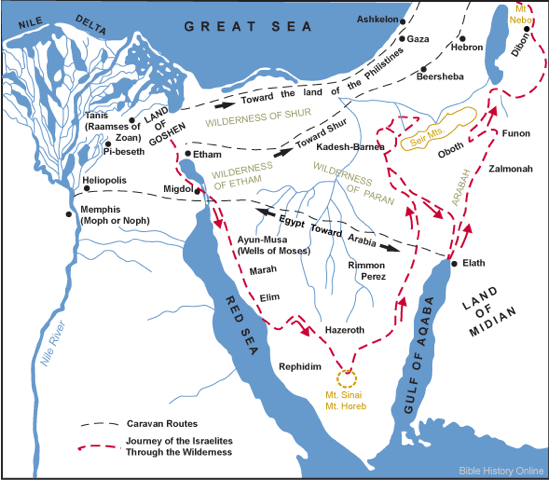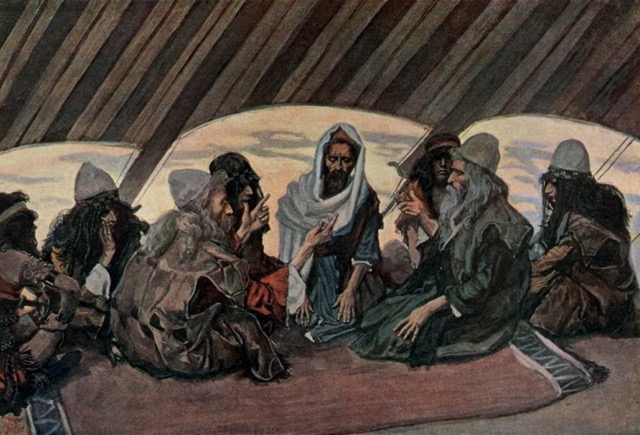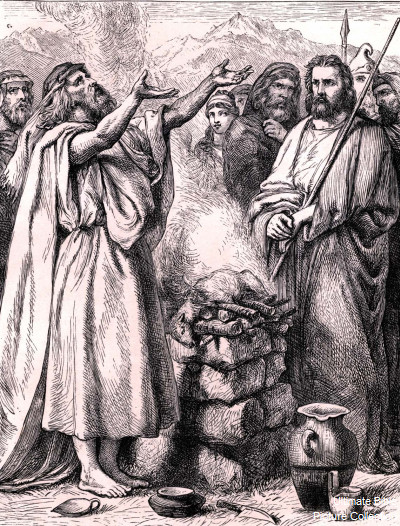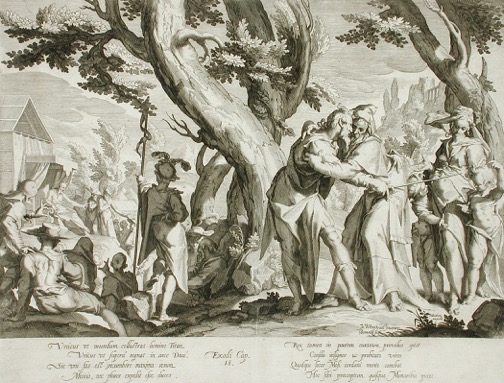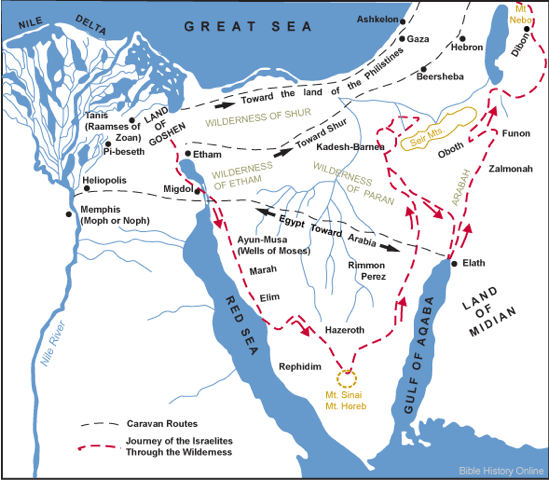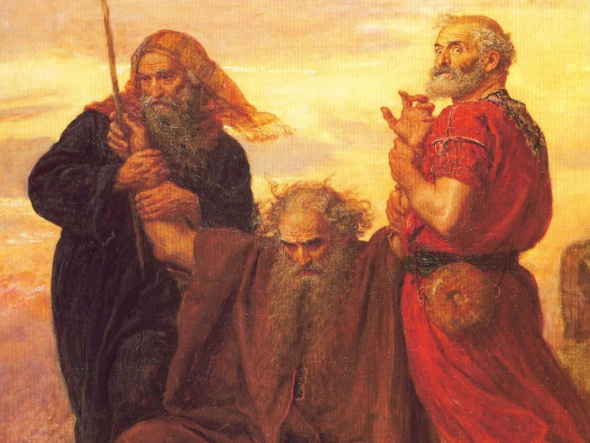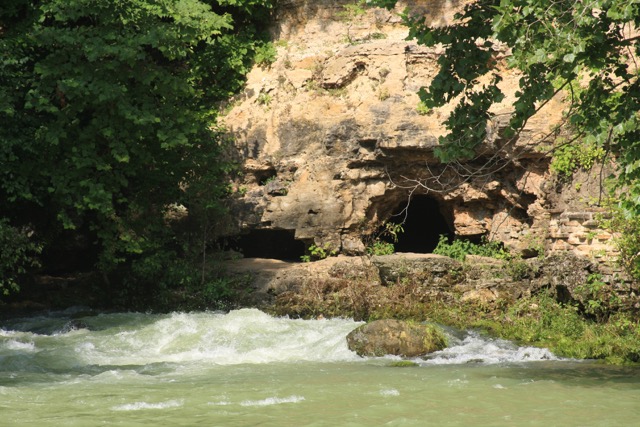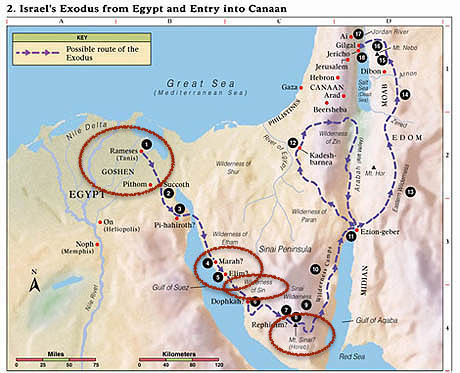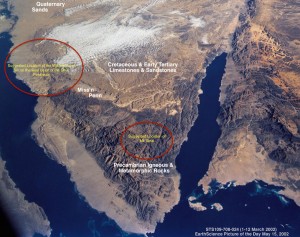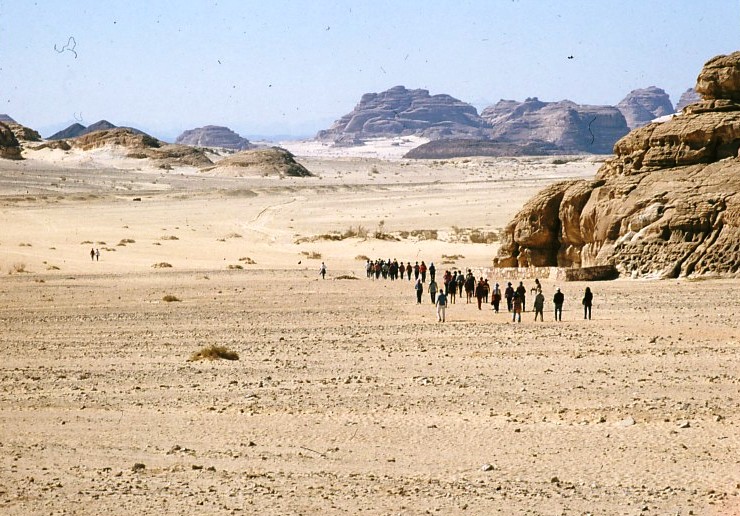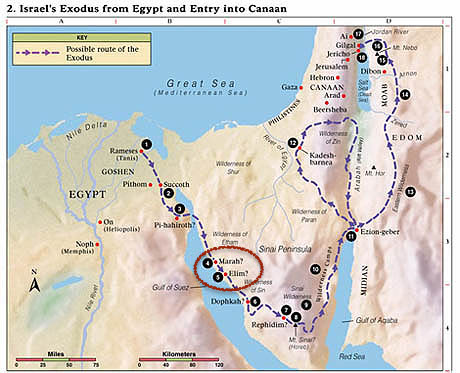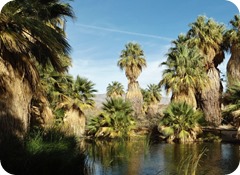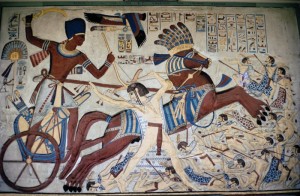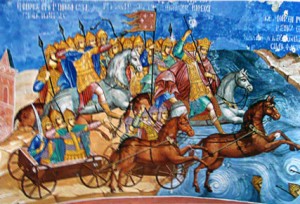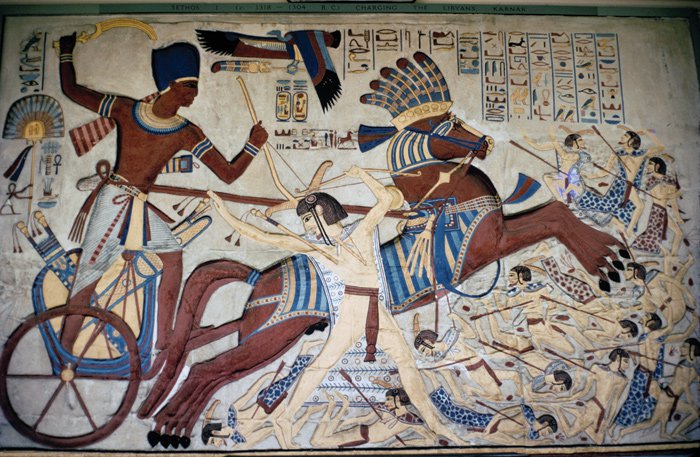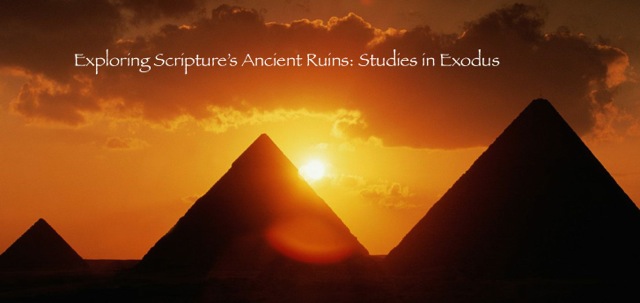
©1998-2015
Fellowship at Cross Creek
Life of Moses
Lesson 28
Sustainable Bread
Ex 16:19-36
Introduction: How would you feel if you skipped a meal? Okay, not the biggest loss in the world, but what about two meals? Now that is starting to push the envelope a bit? What about an entire day? Not the easiest thing to do, but it can be done, for some, is sadly the case? What about multiple days? Can you imagine fasting, perhaps just on juice and water, for an entire week? What about forty days? We take our daily food provision of food so for granted, so that even if we skip a meal or two or a few days worth of food, we can get very, very cranky, do we not? Now let me ask you another question? What about your daily Spiritual food allowance? Can anyone really imagine going very long without some thought or interaction with God or Spiritual truth? And yet some do it all the time. Some do it their entire lives. I can only imagine. My real concern is what kind of filter does that leave one for living life and making daily decisions? Where do ones ethics, values and morals arise from? Can this type of person really be trusted when it is all said and done? How do we know that when the chips are down, that in the end, this person won’t cut and run? We don’t. And yet, God’s children do. Why? Not enough Spiritual food. Not enough God. Not enough Spiritual nutrition. Want to have a reasonably healthy body, then eat well, sleep well and get plenty of exercise. Want to have a healthy mind, then Spiritually eat well, rest well and get plenty of Spiritual exercise in as you seek to fulfill your redeemed purpose in Christ—learn to love others well.
In the end, do you believe and trust that God’s Spirit will not only provide for my physical needs, but my Spiritual as well?
So here is my question: why might Yahweh be preparing his people for receiving his larger law in later chapters of Exodus via connecting their provision of daily manna with his Sabbath rest? Just something to think about, because that is what is just about to happen. The Spiritual and the physical are about to join. A legitimate resting from one’s labor…that is one in seven…is paramount to resting in God for one’s ongoing daily provision. Think about it.
This is an interesting section. Twice God seeks to meet his people’s needs and gives them specific directions how they are to do this? Twice some test him and fail to follow those specific directions. Twice someone gets angry. The first time, Moses; the second time, God. This chapter lays the powerful groundwork for the universal truth that God will meet our daily needs, while at the same time asking us for one day a week, set aside solely for enjoying him and his provision for those needs.
General Introduction: Moses, led by God, is leading the children of Israel, perhaps as many as 2-3 million strong, away from Egypt and closer to the land promised to the forefathers nearly seven centuries before. But their journey is not without its problems.
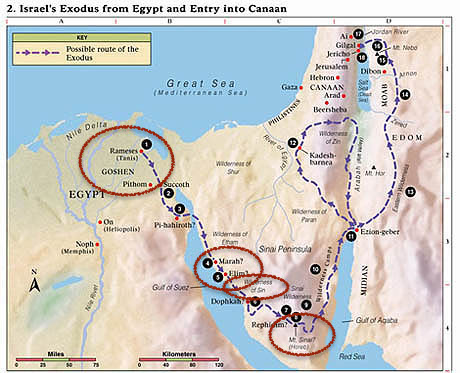
Recent Studies…
The sons and daughters of Israel sing out their praise to Yahweh because in what Yahweh God has just done in not only delivering Israel from utter annihilation at the hands of Pharaoh’s massive army, but in utterly annihilating Pharaoh’s army, Israel’s future, including her travel to and then being planted within her promised land is also secure. Ex. 15:1ff.
After healing Marah’s bitter waters, Yahweh tests Israel with a lasting ordinance—if you keep my laws, I will keep you safe from all the things that the Egyptians feared. Ex. 15:22ff.
Now, with their backs seemingly up against another wall–the wall of daily sustenance in the desert, the whole community rises up to turn its collective fear and complaint towards God’s servants. Ex. 16:1ff.
Pray
Read Passage several times…(if more than 12 verses, I would read only twice).
Ask Questions…
19 Then Moses said to them, “No one is to keep any of it until morning.”
What are they supposed to do this? Eat it all during the day and perhaps through the night, but by morning is the manna decayed or rotten? So for some reason, this food is highly perishable? Interesting, would refrigeration have kept it fresh? Was this to show that God would and could meet their daily needs? Why not store it up? (This seems huge to me…)
20 However, some of them paid no attention to Moses; they kept part of it until morning, but it was full of maggots and began to smell. So Moses was angry with them.
Isn’t there always some who will try to cheat or bend the rules, test the limits? What are maggots? Fly larvae? Even if they had baked it, did it still go bad?
21 Each morning everyone gathered as much as he needed, and when the sun grew hot, it melted away.
Like dew on the ground that disappears with the morning sun? Does this mean, like water, it was highly volatile, turning from a more liquid dew to water in the atmosphere? Amazing…

“My first frost flower…..kind of a heart shape.
Perfect.” by Nancy Jesser Halsey (Posted on Facebook on November 13, 2014).
22 On the sixth day, they gathered twice as much –two omers for each person –and the leaders of the community came and reported this to Moses.
Why did the leaders feel this necessary to report this to Moses? Was this what they were supposed to do? Were the leaders concerned that the people should not have done this, just as they shouldn’t have on the other days when the manna had become rotten with fly maggots or larvae? And why did it work on the sixth day, but not any other day? Was this a miracle of God? How much is an omer? And notice, somehow divinely, much like your cell phone bill depends upon how many cell phones one has, the gatherable manna is pro-rated for the number of people per family, so that on that sixth day, if you had 6 people in your family, you were allowed to gather 12 omers for two days worth of manna, but if you had seven people, one could gather 14 omers, and if you gathered 15 omers, or one omer too much, then I suppose that extra omer would rot? So, in essence, much as the cell phone companies can track a persons calls and call minutes, texts and data usage, God, who created the laws of physics to do this kind of tracking to begin with, was able to do this with Israelite manna collection, even on that sixth day? Amazing…
23 He said to them, “This is what the LORD commanded: `Tomorrow is to be a day of rest, a holy Sabbath to the LORD. So bake what you want to bake and boil what you want to boil. Save whatever is left and keep it until morning.'”
So a person could both bake and boil manna?
Was this their first Sabbath because obviously, Yahweh had NOT given Moses Israel’s Laws or entered into a covenant with her yet? There was about to be a Law for Israel, but not yet. So the need to rest on the Sabbath is more important than the need to gather manna daily, not that gathering manna had to be necessarily difficult, which does beg the question, how long did it take to gather manna, and was it difficult or time consuming or easy? This says a lot about the importance of the Sabbath.
24 So they saved it until morning, as Moses commanded, and it did not stink or get maggots in it.
So, almost like a test, gathering twice as much manna on the sixth day did not result in the manna’s becoming full of maggots on the morning of the seventh day? Another miracle? A weekly suspension of natural laws related to the manna? What is God trying to teach Israel? Trust me? Listen to me? Worship me and I will meet your daily needs? I can make the bread rot one day and not the next.
25 “Eat it today,” Moses said, “because today is a Sabbath to the LORD. You will not find any of it on the ground today.
The manna didn’t even appear. Again amazing. So with the gathering of the daily manna, gathering too much of it that it became rotten with maggots, gathering twice as much on the sixth day and it not rotting with maggots on the seventh day and there being no manna to gather on the seventh day now clearly anchors or establishes the Sabbath in the minds and hearts of these early Israelites. The Sabbath was real. God was resting, and so should they. A precedent had been set—a day to recharge the batteries…and someday, a day to worship.
26 Six days you are to gather it, but on the seventh day, the Sabbath, there will not be any.”
What does Sabbath mean? Why did they call it Sabbath? Because it was the seventh day or a day of rest, when one ceases from their labors?
27 Nevertheless, some of the people went out on the seventh day to gather it, but they found none.
Just as there were some who had to test gathering too much on a normal day, some had to test gathering manna on the seventh day?
28 Then the LORD said to Moses, “How long will you refuse to keep my commands and my instructions?
This testing of God’s commands now provokes Yahweh who asks their leader and soon-to-be mediator of the covenant a question.
29 Bear in mind that the LORD has given you the Sabbath; that is why on the sixth day he gives you bread for two days. Everyone is to stay where he is on the seventh day; no one is to go out.”
Wow! Not even go out and play? Not even go out and worship? What was God trying to teach the people? Do our bodies, minds and souls need this kind of rest? I feel like mine does from time to time. Done; no juice; empty…
30 So the people rested on the seventh day.
Did they just sleep? Lie around? Play games inside? Talk? What did they do?
31 The people of Israel called the bread manna. It was white like coriander seed and tasted like wafers made with honey.
What is coriander seed? Honey…so it was sweet?
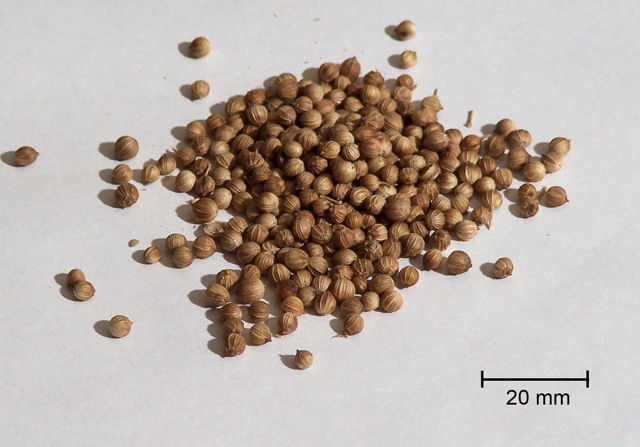
According to the book of Exodus, manna is white, like Coriander seed, (although modern-day coriander seed is yellow/brown).
32 Moses said, “This is what the LORD has commanded: `Take an omer of manna and keep it for the generations to come, so they can see the bread I gave you to eat in the desert when I brought you out of Egypt.'”
What is an omer? A quart? Why did God want to do this? To prove to later generations that this was not a myth? That it really was true?
33 So Moses said to Aaron, “Take a jar and put an omer of manna in it. Then place it before the LORD to be kept for the generations to come.”
Clay jar? Why would it not rot? Another miracle? I wonder how long it did last? Where did it eventually end up–lost with the ark (or box) of the covenant ? Did they keep it in the ark (box) containing the covenant (treaty/contract) that God and Israel are about to sign (or agree to)—that he will be their God and they will be his people?
34 As the LORD commanded Moses, Aaron put the manna in front of the Testimony, that it might be kept.
But what is the Testimony? The ark? Did they have it yet? Wasn’t this later?
35 The Israelites ate manna forty years, until they came to a land that was settled; they ate manna until they reached the border of Canaan.
That is a long time. So despite their eventual disobedience at Kadesh Barnea which turned a short journey into a forty year wandering, God still provided for their daily needs…interesting? Did they grow tired of the manna?
36 (An omer is one tenth of an ephah.)
What is an ephah?
Who? Moses, them (Israelites), No one, some of them, everyone, he, each person, leaders of the community, LORD, some of the people, everyone, no one, the people, people of Israel, Aaron, Israelites
Where? On the ground, went out, stay where he is, go out, in the desert, in front of the Testimony, came to a land, the border of Canaan
When? Then Moses said, until morning, began to smell, each morning, when the sun grew hot, on the sixth day, tomorrow, a day of rest, a holy Sabbath, until morning, eat it today, today, six days, seventh day, the Sabbath, seventh day, then the LORD, how long, Sabbath, sixth day, two days, seventh day, seventh day, generations to come, when I brought you out of Egypt, then place it, generations to come, forty years, until they reached
What?
The Gathering of Just Enough Manna for Each Day
• Moses commands the people to not keep the manna until morning…or a whole day…use it up or throw it out that night (because God is going to provide again tomorrow). 19
• However Moses becomes angry because some test God anyway and keep it until morning; it becomes full of maggots and smells. 20
The Gathering of Twice the Daily Amount on the Sixth Day
• Each gathered as much as he needed each morning until the sun melted the dew away. 21
• Then the leaders of the community reported that on the sixth day they gathered twice as much. 22
• In contrast to every other day, Moses tells them that this seventh day is to be a day or rest which is sacred or belongs to the LORD. Therefore, they are bake or boil it on the sixth day and save it to the next day. 23
• They did this and sure enough, unlike the other days when some tried to save it, and it rotted, this day the manna does not spoil. 24
• Moses then told them to eat it that day because not only would it not spoil, but more importantly there would be none to gather in the morning in the first place, thus making this next day a special day of the week. 25-26
• But again we have people who test the Lord and fail to follow his clear instructions. They went out on the seventh day, and there was no manna, much like many businesses feel that they can’t afford to close on a Sunday. 27
• This time the LORD gets angry and asks a prophetic question to Moses: “How long will you refuse to keep my commands?” 28
• He goes on to say that I want you to keep in mind that I have given you the Sabbath…as a day or rest. That is why you are to gather twice as much on the sixth day (presumably Friday) and not go out on Saturday. 29
• So the people did rest on the seventh day (Saturday). 30
The Saving of a Sample for Generations to Come
• Ultimately the people called the bread manna. It was white and tasted like sweet wafers. 31
• Moses then said that the LORD had commanded them to take a jar, put about the same amount of manna they gathered everyday in it and then place it before God for generations to come. So Aaron put the manna in front of the Testimony to be kept. 32-33
• Israel ate the manna for forty years until they reached the Promised Land (note: had they obeyed at Kadesh Barnea and takend the Promise Land as originally commanded, eating of manna might have only been for a few months. Instead due to their disobedience, their dependence upon manna lasted for over forty years).
Summary….
This Week…First the People are commanded to gather and keep enough manna only for that day; some disobey. Their extra manna spoils, and Moses becomes angry concerning their testing of Yahweh’s commands. 19-20.
Second, they are told to gather twice as much on the sixth day and to save a portion of it for the seventh day because this day is to be a day that belongs to their Deliverer, Yahweh God, and they are to rest in his provision. Again, a few test God by going out to gather manna, and there is no manna. This time God becomes angry. 21-30.
Third, Israel is told to set aside one daily sample before Yahweh so that generations may know how Yahweh provided for his people. 31-36.
Bottom line…God provides in a very unique manner. And make no mistake about it, it is God meeting the need. Why else would the manna rot every other day they attempted to keep it overnight, but on the seventh day, it did not rot and was not on the ground. God had a purpose: for the nation to not only trust that God would provide for his people on a daily basis, but that one day in seven they were to recognize this daily provision by not going out to gather the bread.
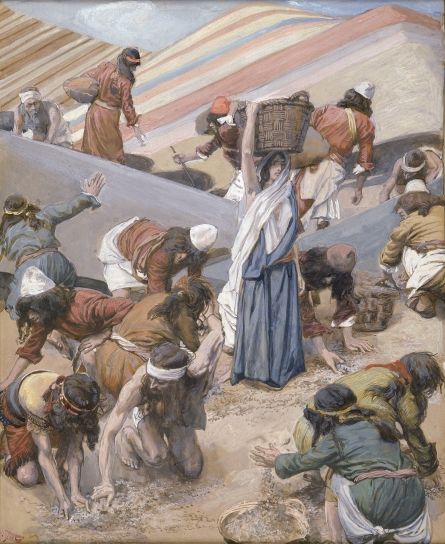
Tissot The Gathering of the Manna (color)
Why? (What truths do I learn about God, man, people, myself, life?)
• Obedience and trust matter to the Provider; details count as well.
• God can and does provide for his children daily.
• God desires some form of worship or recognition. Some ceasing from the normal or daily activities to recognize that he is the one that is ultimately meeting and providing for our needs.
• Some people will test the limits or the boundaries of God’s provision regardless.
• That much like Moses, God too will express his feelings about his children’s lack of trust and obedience.
• That God didn’t just make plain bread, but made it desirable by ensuring it was also sweet to the taste. My family once had a maid who also cooked and who added a little sugar to turnip greens and squash to make them more desirable to us younger kids. Thank God!
• God knows and understands our need to rest and recuperate. Life is not all about work. Though work does provide for our needs, and there are some who like to work and some that don’t like to work. In the end, there must be a balance. Too little is costly and so is too much. Too much may sound good in theory, but in the end, it leads to burn out. Therefore there is a portion of our life’s budget that should be devoted to taking a break…resting. The grind should not go on forever, and in so doing, this should prevent the burnout that so many so often feel, especially concerning their labors.
• In the end, God is a good, kind and fair employer. He provides just enough work to keep us out of trouble, but not too much to turn us into slaves to our desires or insecurities.
• It is important to remember things—especially important moments of God’s provision We do this in baptism and the Lord’s Supper—we remember not only how our Lord was baptized or immersed and observed that last Passover with his disciples, but we commemorate both our new birth in Christ as well as his sacrifice to atone for our sins until his Return.
So What?
2003 Application (one year after we moved into our new church home)…
Struggle? My seemingly trivial concern made large.
Major concern for the moment…only for this moment…is my grass. This may seem trivial to some. But it is important to me for the following reasons. I over-seeded and fertilized the Bermuda seed over the rye grass in the outfield just over a couple of weeks ago. Therefore the seed did not have as much access to the soil as it normally would have. The seed is so light and would have landed softly on the rye grass. So we mowed it to further spread the seed. Then the rains stopped and we just had to depend upon our in ground water system (thank God for that).
Now I have to go on vacation for two weeks. Which is not too bad, except for the fact that I have the sides/ foul lines and in front of the church to plant as well and will have to manually water these sections.
Because the seedbed needs to be lightly water 3-6 times a day, this is a lot of work and water management, moving hoses and sprinklers. It will require all most constant attention until the seedbed is established, which should take about three plus weeks.
Add to this that the ground has to be prepared/scratched and, at some point in time, some rocks will need to be picked up.
Finally all the seed needs to be planted by the end of July/the first of August. The reason for this is that the seed needs 70 degree nights to properly germinate and this has been the coolest summer in quite some time (hardly any 70 degree night so far through June).
So bottom line, I have a seedbed that needs to be properly prepared, and I have seed that needs to be critically constantly watered. I need heat—warm nights. I need lots of water…and water moved around properly. Or it all waits again until next year…which can happen. That’s why giving up two weeks in July for vacation is tough, but this is the only time Rhonda can go because of her work. She would stay, but I can’t do that to her nieces and nephew, since we rarely get to see them because they live in California. We really need to go.
Truth? Joe, God knows your need. He will provide your daily needs and not before.
Application? Can I trust him? Can I trust him with respect to my vacation or a momentary season of Sabbath (rest)? We have not taken any time off in two years besides an occasional weekend—which I am trying to do better at, utilizing my associate pastor to teach more in my place.
It is time to go. Trust me, Joe. No matter what happens. Can you trust me with almost blind faith? Can you rest in me? No matter what happens? Whether the grass grows or not, whether the seed germinates or not? Whether the rocks are picked up or not? Whether there is any rain or not? Whether it is warm enough at night or not? Whether there is enough water or time or help or not? Can you trust me?
Yes, Lord. I can and must. I place this field, its preparation, its seed, its water, its temperature in your hands…succeed or fail. It belongs to you. I hope to achieve my objective within the timetable I desire, but if you see fit not to, I will accept your will. It’s your field LORD, not mine. And you know when you want the family of God to play on it and not a moment sooner.
Note: I have learned a lot over the years with respect to planting, watering and fertilizing grass. I have also made tons of mistakes. The grass is still there, at least on the ball field. It appears to be a variegated mess of both cool and warm season grass, along with lots of broad leaf weeds, but it survives. Not having a consistent watering source for the cool season grasses under the trees and around the church has been more of a nightmare. I have replanted on more than one occasion. Attempting to allow it to go dormant during the hot summers has been for the most part a failure. But I was such a novice and so nervous 12 years ago when we last studied the Life of Moses. In the end, life has moved on, along with lots of hard work and with some successes and many failures. That’s just life. With just about every thing there is a learning curve, a preserving and surviving. We have survived, this much I can say. How well have we done is much more to difficult to measure.
2015 Application…
Thanksgiving…It feels like for the most part it has been a productive week. Last Sunday went fairly well. I think I made my point, though slightly rushed near the end. My flock was thinking about the depths and honesty of prayer, including asking for what we need and why we are asking it. In the end, if we really understood we were talking to the Creator of the Universe, we might stop lying to ourselves, because we are certainly not fooling God (1 John 3:18ff), for God knows all and is greater than our hearts according to John. Ineffective, shallow prayers only dull the specificity, truth and power of what we are asking, not only on our own behalf, but on behalf of others, which is perhaps much much more critical to sustainable, Spiritual fruit bearing.
Also did some intense, but hopefully profitable counseling, a lot of much-needed mowing, and enjoyed some intimate time with my wife this weekend. It was a good week.
Struggle…While I am being held accountable to finish up some holes in Sustainable Love, which is really, really wonderful, I feel like there are a lot of people I need to pastorally check on. Regardless of how well a pastor attempts to study, compose, teach, write, counsel, manage and pastor, just like a patient probably needs an annual checkup or physical, the sheep need periodic checkups or check-ons by those who have been tasked the responsibility of watching over them. In other words, it still takes one-on-one to make sure that they understand and are applying what is being taught or valued.
Truth…More effort or work to fully secure or satisfy one’s future needs is a futile canard. It can all be, and quite often is, taken away in a moment, either by death or by personal or historical ruin. Nothing is for sure. Nothing–except God, and Evil, as the Scriptures teach, until the Creator judges this fallen world and replaces this corrupted world with his New Heavens and Earth. But God has promised to meet our daily needs (Matt. 6:25ff), and in so doing, when we do focus, work, trust, seek his leadership, care for others and rest in him, what we are supposed to have for our ultimate good, regardless of the times (Romans 8:28ff), be they blessing or persecution, will be graciously provided for us, and that my friends, you can take to an eternal bank where there is never a shortage of peace of mind that one can draw upon at any moment of any given time or situation. Amen. Amen.
Application…It is not about getting everything done. That will never never never ever happen. Why? Because it can always be better, and there will always be needs…wants, desires. This is NOT and never will be a perfect world, not until Christ returns, and even then, despite the King of Kings presence, it will have its sinfully, flawed corruption. What does all this mean? I work for a King, and I take his orders. Much like was the case when I worked on a farm as a young boy, if he wants me to work in one field one day and somewhere else the next day, that is his divine prerogative….because I have the promise that he works everything out for my…our…good and that he will never leave me, nor forsake. What else is there? I have God. End of story. I have my reward…my provision…my comfort…my hope…my joy…my strength…my pleasure…my purpose…my stewardship. And much like my imperfect attempts to grow and maintain the church’s grounds and grasses, so will be my pastoring and anything else I attempt to do. Whether I like it or not, I am in process, even at the ripe old age of 58, even after having pastored the same essential flock for almost thirty years. We will survive, and it will be far less than perfect, and that is okay. Very imperfectly, I am about my Father’s business, and as I am about it, he has promised to meet my daily needs, and so far – for more than thirty, in fact, all of my life, he has. What more is there really? Peace of mind? He has given me that too, but not based on the outward circumstances, but His Spirit who is constantly teaching me God’s truth. Provision, purpose, peace of mind…I am blessed. We are blessed.
Sincerely,
Your servant,
Joseph M. Cross
Your struggle?
Truth?
Application?
Your student’s struggles?
Truth?
Applications?
Scripture quotations, unless noted otherwise, are taken from the Holy Bible: New International Version‚ NIV‚ Copyright 1973, 1978, 1984, International Bible Society. Used by permission of Zondervan Bible Publishers. All rights reserved.





